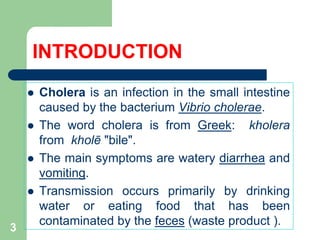A cholera overview is an essential step in treating cholera infections. While the disease occurs most often during epidemics, it can also strike in isolation. In such situations, an interprofessional team is required to help patients manage the illness and prevent further infections. However, it is important to remember that cholera is extremely contagious and should not be taken lightly. In addition, the disease is highly contagious and can lead to death if not diagnosed and treated early.
In 2013, there were over 6,000 deaths due to cholera in 25 countries, 17 of which were in Africa. The case fatality rate was 1% in four countries and one to five percent in another 17. In total, 65% of cholera deaths were reported in Africa. The virus is spread via water and food. Symptoms include diarrhea, vomiting, nausea, and fever. There is no specific treatment for cholera.
According to the World Health Organization, cholera is a severe diarrhoeal disease caused by the ingestion of contaminated water. In recent years, the number of people affected by the disease has increased dramatically. In addition to its inflammatory symptoms and deadly gastrointestinal effects, cholera can be a serious threat to human health. Experts agree that an outbreak of the disease can kill up to half of its victims.
Although cholera is endemic in a number of countries around the world, the disease is mostly found in developing countries. The World Health Organization (WHO) recently launched an initiative titled Ending Cholera – A Global Roadmap to 2030. It identifies a number of priorities for reducing cholera mortality by 90% and stopping transmission in up to 20 countries by 2030. The Centers for Disease Control and Prevention (CDC) supports the global strategy through participation in the task force working groups. The U.S. Agency for International Development sponsors U.S. government activities in developing countries and supplies for patients.
A cholera outbreak is a serious and widespread health problem. Infected individuals are highly susceptible to the disease and are at higher risk if they have poor sanitation. A high-income country with clean water and sanitary facilities is at less risk of contracting cholera. Vaccines and anti-diarrhea medicines are the best ways to treat cholera. The WHO has provided a comprehensive cholera overview to help healthcare providers prevent the disease.

A cholera outbreak can be devastating, but luckily, it is a disease that can be prevented. There are many factors that contribute to a cholera outbreak, and vaccinations should be considered in the context of the region in which it occurs. Moreover, a cholera outbreak can be controlled if the affected population is vaccinated. If you have a close relative or a loved one who is affected by cholera, it is important to seek medical care immediately.
While cholera is endemic in some parts of the world, it is not widespread in a high-income country. Despite this, it is a common disease in many developing countries, especially those with poor sanitation. Therefore, vaccinations are important, even if cholera does not occur in your area. A vaccine is available for cholera in the United States. For more information on cholera, visit the WHO website.
A cholera outbreak requires a multisectoral approach. This means that prevention of cholera is critical to the health of the entire population. A multisectoral approach can help control the disease and limit its environmental impact. It is also vital to provide care for the victims. Site https://www.produkkesehatanindo.com/ describes how important it is to provide emergency care to cholera patients in order to prevent an epidemic.
The World Health Organization reports that in 2013 there were 1.3 million cases of cholera and 56,000 deaths worldwide. These cases have occurred in several countries including India, the Middle East and the Caribbean. The disease has the highest mortality rate in developing countries, but is not as common in developed countries. This is most common in low-income countries. To date, a cholera vaccine is available. Vaccines for the cholera outbreak are available on the WHO website.
A cholera outbreak can affect a country's economy in different ways. The affected population will be at greater risk than the general population. It is also extremely important to ensure the safety of the environment for affected people and those around them. In addition, cholera can affect tourism, the food trade, and the overall economic well-being of a country. It can also negatively affect the economy. This disease can lead to serious economic and social damage.